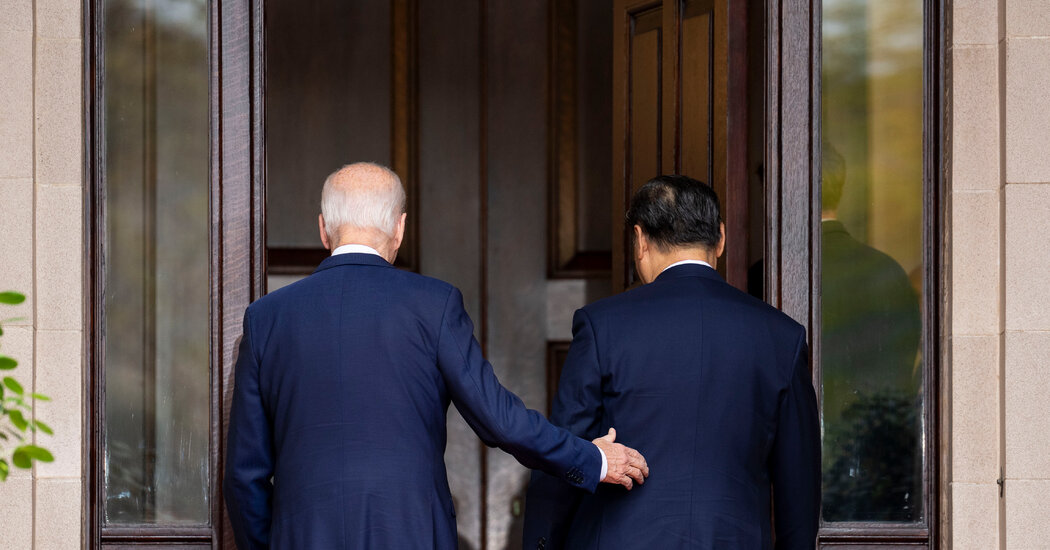When President Biden met with President Xi Jinping on Wednesday in the outskirts of Silicon Valley, there was a subtle yet notable shift in the power dynamics between two countries that have spent most of the last few years denouncing, undercutting, and imposing sanctions on each other.
For the first time in years, a Chinese leader desperately needed a few things from the United States. Xi’s list at the summit started with a reactivation of U.S. financial investments in China, and a breakthrough in technology export controls that have, at least temporarily, constrained Beijing’s ability to manufacture the most advanced semiconductors and artificial intelligence advancements.
All of this might explain why Biden’s advisers were able to negotiate, fairly quickly by Chinese diplomatic standards, potentially significant breakthroughs on stopping the flow of fentanyl chemical precursors to the U.S. and the resumption of communications between militaries, critical aspects for two superpowers whose forces clash every day.
The looming question now is whether Xi’s charm offensive – on full display Wednesday night as he entertained CEOs – marks a lasting change or a tactical maneuver.
While Biden’s aides were pleased with concrete results from the summit, they readily admitted that they could be short-lived and were designed to help Xi overcome China’s toughest era of bankruptcies, property value collapses, and consumer confidence loss in four decades. Nonetheless, Biden seems happy to seize the respite, hoping for more time before the presidential election to rebuild manufacturing competitiveness and limit China’s advances in the Pacific.
But few doubt that when he can, Xi will revive his efforts to displace the U.S. as the world’s most capable military, technological, and economic power.
Still, the change in tone, however temporary, was welcomed. It began over the summer, when Secretary of State Antony J. Blinken made a trip to Beijing that had been delayed by the Chinese spy balloon incident. As China’s economic crisis depth became apparent, Blinken reported being surprised by the enthusiasm for visits from Treasury Secretary Janet L. Yellen and Commerce Secretary Gina Raimondo. Quiet meetings were held in Vienna, and then in Washington, between National Security Adviser Jake Sullivan and his counterpart, Wang Yi.
It was all designed to culminate with the meeting with Xi, which lasted four hours on Wednesday at the Filoli mansion and gardens.
During the meeting, Xi complained of the harm done to China by its portrayal as a villain in the U.S., according to administration officials who spoke unofficially about the discussions. Xi voiced his loudest and lengthiest protests about cutting off of faster computer chips, to which Biden responded that it would assist the Chinese military. The two leaders fundamentally disagreed on that issue: what Xi sees as economic strangulation, Biden views as a matter of national security.
But the tone was always measured, at times friendly, fueled by Biden’s reminisces of past travels with Xi to China, the U.S., and summits around the world. Xi then fine-tuned his speech to CEOs to recall happier moments in U.S.-China relations.
“It struck me as a speech that could have been delivered seven or ten years ago, in the era of engagement,” said Michael Froman, former U.S. Trade Representative and Citigroup executive, who recently became president of the Council on Foreign Relations and attended the dinner. “It was as if the era of ‘wolf warrior diplomacy’ had never existed and some of the events of the last few years had not occurred.”
Indeed, the most startling element of the visit was Xi’s apparent abandonment of the “wolf warrior” tone, a tone that the Chinese leader himself had encouraged.
The phrase came to embrace a Chinese diplomatic style, directed especially, though not exclusively, at the U.S., where Chinese envoys described the end of an era of American dominance. China was rising, the wolf warriors proclaimed, and the U.S. was in unstoppable decline. The arguments closely echoed some that Xi himself made in speeches to party leaders and military officials in Beijing.
Xi sent one of his favorite wolf warriors, Qin Gang, to Washington as his carefully chosen ambassador. During Biden’s first year, the envoy spoke of “lies and disinformation” about China being “spread every day.” He complained: “China is treated like a child, her parents scold her every day. ‘You are wrong. You need to do this. You shouldn’t do that’.”
Then, when Qin was called back from Washington to become Foreign Minister, it was assumed in Washington that his approach had succeeded, and that he was being rewarded for the straightforward direct diplomacy that once led Sullivan to ask aloud, “Who calls their diplomats wolf warriors?”
Xi seems to have reconsidered the wisdom of doing so. Qin disappeared over the summer, shortly after meeting Blinken in Beijing. The ongoing talks since then have been largely practical, not combative ones.
Blinken was able to negotiate guidelines for cracking down on fentanyl chemical precursors during his summer trip, and the Chinese quickly outlawed the trade of those chemicals and in the last week began arresting offenders, most identified by the U.S. It was reminiscent of an earlier time when China took drastic measures against arms and technology firms selling parts to North Korea or Iran. Still, U.S. officials caution that they expect some chemical manufacturers to figure out how to evade the sanctions and return to the market. But this makes their lives complicated.
When Wednesday’s conversation turned to communications between militaries, Xi repeatedly urged Biden to simply pick up the phone and call if there was any problem. Of course, calls between the leaders of the two countries are never that simple.
